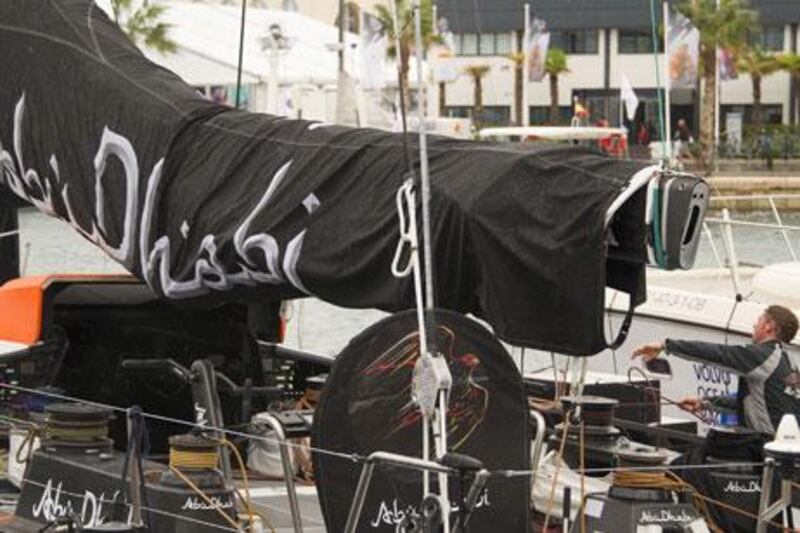ALICANTE, SPAIN // Now comes the routine that doubles as a crescendo.
Six voguish sailboats will edge off the dock Saturday, no big deal there, except that they embark on the global circumnavigation of the Volvo Ocean Race, big hubbub there.
Two years of planning, budgeting, designing, boat-building, launching, testing, deciding, customising, customising and customising will find a finish line at a starting line.
Abu Dhabi Ocean Racing's Azzam and five rivals will aim for the Mediterranean Sea, the Atlantic Ocean, the meaty winds of yonder out towards Brazil and 6,500 nautical miles of Leg 1 hassle towards Cape Town.
The forecast calls for a "brutal" first overnight, according to the race meteorologist Gonzalo Infante, while the start at 2pm in Spain - 5pm UAE - calls for esoteric emotions ranging from wistfulness (families) to eagerness (sailors) to tension (shore team members who maintain the boats).
"It's a bit like exams, your school exams," said Ian Walker, the Abu Dhabi captain. "You study for so long, you actually just want to go ahead and do them."
"We've done this so many times now," said Brad Jackson, the Puma watch captain, whose five previous Volvo Ocean Races tie him with Camper's Stu Bannatyne for most experienced among the 66 total crew members.
"You know what you're in for."
The boat-smart Shore Team members have been in for untold toil across recent months, so they are in for a milestone as they stand watching the vessel that has governed their lives stream away toward the oceans for which she was built. Already there has been the in-port race last Saturday, which gave Abu Dhabi the early lead, but this Atlantic-bound moment proves much weightier, dredging up the word "apprehension".
"You get nervous," said Mike Danks, the technical manager of a bustling Abu Dhabi Shore Team that from time to time has 10 or 11 mainstays. "What's going to break down, and what haven't you done."
He paused and said: "Apprehensive."
"You look after it - it's your little baby, isn't it," said Tim Sellars, the engineer. "You're probably a little bit relieved, relieved that the actual boat is actually starting the leg and doing the race."
"Their DNA is in this boat," said Jamie Boat, the Abu Dhabi team director. "Literally."
So they worry, as do the sailors, but more fleetingly.
Said the seasoned Jackson: "You know, I guess you have a bit of anxiety leading up to the starting, because of obviously everything you're doing for the previous 18 months or nearly two years.
"Hopefully, you've gone down the right road and made the right steps so when you do sail, you're racing a good package."
His Volvos and Whitbreads (the race's previous sponsor) stretch clear back into last century, to the 1993-94 race when, at 25, he said, "I didn't really know what I was up for, really." Nowadays he knows. "You worry about it for a while and then you start racing and get into it, and it all goes away."
It goes away and then the shore team men keep worrying.
For one thing, they remain on call as the boat zooms toward the unpredictable. Sellars, for one, has lived recent months under the demanding reign of the Azzam keel system, at times even dreaming while asleep about the keel system, which probably does beat dreaming about snakes or sharks.
He has met daily with Danks about the keel system, then taken on the task of fine-tuning.
"All that hard work and all those endless days and nights," said Sellars, who has followed the race since he was a 10-year-old Sydneysider and is now in its midst. "This is it. It's really paying off … It does take over your life, but that's part of it. It's a lifetime experience."
He noted that during the past three months, Azzam has logged about 6,000 miles in testing, which lends some reassurance.
For this unsure nascence, though, those left behind hope the phone stays hushed. As Sellars said of the sailors: "We taught them a lot, and they'll assess the problems themselves." And as they do, the commendable shore team will turn around and, said Sellars, as "We have to pack up the base."
ROUGH SEAS AHEAD
The first Volvo Ocean Race weather briefing brimmed with savagery.
Race meteorologist Gonzalo Infante used terminology such as “a harsh first night”, “brutal”, “lots of energy-sapping tacks”, “really unpleasant steep waves” and “the priority will be to ensure they don’t break the boats”.
The culprit: a “secondary weather front spawned by a 1,500-mile-wide low-pressure system” hovering in the Spanish northwest. Upshots included 30-knot headwinds around the Strait of Gibraltar exiting the Mediterranean Sea.
“It’s really going to be a pretty tough first 24 hours,” the Puma skipper Ken Read said. “I guarantee there’s not going to be a whole lot of sleep on these six boats. I think this is what we signed up for. This is what we do. We take what Mother Nature can throw at us.”
THE SCHEDULE
October 29 In-port race at Alicante, Spain (winner: Azzam)
Saturday, November 5 Alicante to Cape Town, South Africa
December 11 Cape Town to Abu Dhabi
January 14, 2012 Abu Dhabi to Sanya, China
February 19 Sanya to Auckland, New Zealand
March 18 Auckland to Itajai, Brazil
April 22 Itajai to Miami, United States
May 20 Miami to Lisbon, Portugal
June 10 Lisbon to Lorient, France
July 1 Lorient to Galway, Ireland





